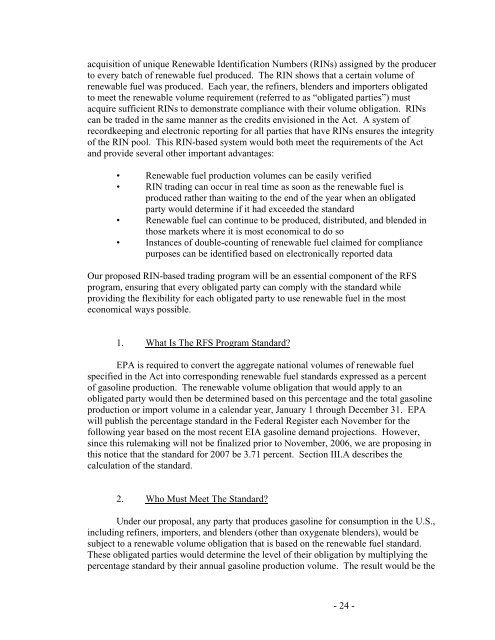Regulation of Fuels and Fuel Additives: Renewable Fuel Standard ...
Regulation of Fuels and Fuel Additives: Renewable Fuel Standard ...
Regulation of Fuels and Fuel Additives: Renewable Fuel Standard ...
You also want an ePaper? Increase the reach of your titles
YUMPU automatically turns print PDFs into web optimized ePapers that Google loves.
acquisition <strong>of</strong> unique <strong>Renewable</strong> Identification Numbers (RINs) assigned by the producer<br />
to every batch <strong>of</strong> renewable fuel produced. The RIN shows that a certain volume <strong>of</strong><br />
renewable fuel was produced. Each year, the refiners, blenders <strong>and</strong> importers obligated<br />
to meet the renewable volume requirement (referred to as “obligated parties”) must<br />
acquire sufficient RINs to demonstrate compliance with their volume obligation. RINs<br />
can be traded in the same manner as the credits envisioned in the Act. A system <strong>of</strong><br />
recordkeeping <strong>and</strong> electronic reporting for all parties that have RINs ensures the integrity<br />
<strong>of</strong> the RIN pool. This RIN-based system would both meet the requirements <strong>of</strong> the Act<br />
<strong>and</strong> provide several other important advantages:<br />
• <strong>Renewable</strong> fuel production volumes can be easily verified<br />
• RIN trading can occur in real time as soon as the renewable fuel is<br />
produced rather than waiting to the end <strong>of</strong> the year when an obligated<br />
party would determine if it had exceeded the st<strong>and</strong>ard<br />
• <strong>Renewable</strong> fuel can continue to be produced, distributed, <strong>and</strong> blended in<br />
those markets where it is most economical to do so<br />
• Instances <strong>of</strong> double-counting <strong>of</strong> renewable fuel claimed for compliance<br />
purposes can be identified based on electronically reported data<br />
Our proposed RIN-based trading program will be an essential component <strong>of</strong> the RFS<br />
program, ensuring that every obligated party can comply with the st<strong>and</strong>ard while<br />
providing the flexibility for each obligated party to use renewable fuel in the most<br />
economical ways possible.<br />
1. What Is The RFS Program St<strong>and</strong>ard?<br />
EPA is required to convert the aggregate national volumes <strong>of</strong> renewable fuel<br />
specified in the Act into corresponding renewable fuel st<strong>and</strong>ards expressed as a percent<br />
<strong>of</strong> gasoline production. The renewable volume obligation that would apply to an<br />
obligated party would then be determined based on this percentage <strong>and</strong> the total gasoline<br />
production or import volume in a calendar year, January 1 through December 31. EPA<br />
will publish the percentage st<strong>and</strong>ard in the Federal Register each November for the<br />
following year based on the most recent EIA gasoline dem<strong>and</strong> projections. However,<br />
since this rulemaking will not be finalized prior to November, 2006, we are proposing in<br />
this notice that the st<strong>and</strong>ard for 2007 be 3.71 percent. Section III.A describes the<br />
calculation <strong>of</strong> the st<strong>and</strong>ard.<br />
2. Who Must Meet The St<strong>and</strong>ard?<br />
Under our proposal, any party that produces gasoline for consumption in the U.S.,<br />
including refiners, importers, <strong>and</strong> blenders (other than oxygenate blenders), would be<br />
subject to a renewable volume obligation that is based on the renewable fuel st<strong>and</strong>ard.<br />
These obligated parties would determine the level <strong>of</strong> their obligation by multiplying the<br />
percentage st<strong>and</strong>ard by their annual gasoline production volume. The result would be the<br />
- 24 -
















